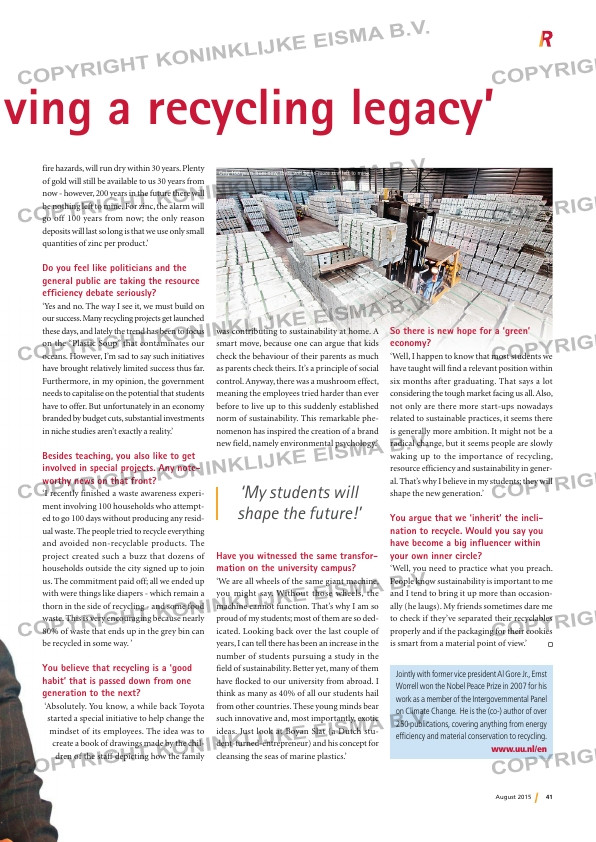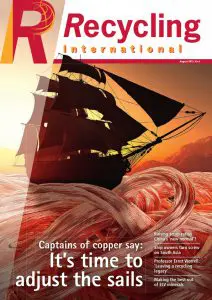Page 41 from: August 2015

41August 2015
‘Lea ving a recycling legacy’
was contributing to sustainability at home. A
smart move, because one can argue that kids
check the behaviour of their parents as much
as parents check theirs. It’s a principle of social
control. Anyway, there was a mushroom effect,
meaning the employees tried harder than ever
before to live up to this suddenly established
norm of sustainability. This remarkable phe-
nomenon has inspired the creation of a brand
new field, namely environmental psychology.’
Have you witnessed the same transfor-
mation on the university campus?
‘We are all wheels of the same giant machine,
you might say. Without those wheels, the
machine cannot function. That’s why I am so
proud of my students; most of them are so ded-
icated. Looking back over the last couple of
years, I can tell there has been an increase in the
number of students pursuing a study in the
field of sustainability. Better yet, many of them
have flocked to our university from abroad. I
think as many as 40% of all our students hail
from other countries. These young minds bear
such innovative and, most importantly, exotic
ideas. Just look at Boyan Slat (a Dutch stu-
dent-turned-entrepreneur) and his concept for
cleansing the seas of marine plastics.’
So there is new hope for a ‘green’
economy?
‘Well, I happen to know that most students we
have taught will find a relevant position within
six months after graduating. That says a lot
considering the tough market facing us all. Also,
not only are there more start-ups nowadays
related to sustainable practices, it seems there
is generally more ambition. It might not be a
radical change, but it seems people are slowly
waking up to the importance of recycling,
resource efficiency and sustainability in gener-
al. That’s why I believe in my students; they will
shape the new generation.’
You argue that we ‘inherit’ the incli-
nation to recycle. Would you say you
have become a big influencer within
your own inner circle?
‘Well, you need to practice what you preach.
People know sustainability is important to me
and I tend to bring it up more than occasion-
ally (he laugs). My friends sometimes dare me
to check if they’ve separated their recyclables
properly and if the packaging for their cookies
is smart from a material point of view.’
fire hazards, will run dry within 30 years. Plenty
of gold will still be available to us 30 years from
now – however, 200 years in the future there will
be nothing left to mine. For zinc, the alarm will
go off 100 years from now; the only reason
deposits will last so long is that we use only small
quantities of zinc per product.’
Do you feel like politicians and the
general public are taking the resource
efficiency debate seriously?
‘Yes and no. The way I see it, we must build on
our success. Many recycling projects get launched
these days, and lately the trend has been to focus
on the “Plastic Soup” that contaminates our
oceans. However, I’m sad to say such initiatives
have brought relatively limited success thus far.
Furthermore, in my opinion, the government
needs to capitalise on the potential that students
have to offer. But unfortunately in an economy
branded by budget cuts, substantial investments
in niche studies aren’t exactly a reality.’
Besides teaching, you also like to get
involved in special projects. Any note-
worthy news on that front?
‘I recently finished a waste awareness experi-
ment involving 100 households who attempt-
ed to go 100 days without producing any resid-
ual waste. The people tried to recycle everything
and avoided non-recyclable products. The
project created such a buzz that dozens of
households outside the city signed up to join
us. The commitment paid off; all we ended up
with were things like diapers – which remain a
thorn in the side of recycling – and some food
waste. This is very encouraging because nearly
80% of waste that ends up in the grey bin can
be recycled in some way. ’
You believe that recycling is a ‘good
habit’ that is passed down from one
generation to the next?
‘Absolutely. You know, a while back Toyota
started a special initiative to help change the
mindset of its employees. The idea was to
create a book of drawings made by the chil-
dren of the staff depicting how the family
‘My students will
shape the future!’
Only 100 years from now, there will be no more zinc left to mine.
Jointly with former vice president Al Gore Jr., Ernst
Worrell won the Nobel Peace Prize in 2007 for his
work as a member of the Intergovernmental Panel
on Climate Change. He is the (co-) author of over
250 publications, covering anything from energy
effi ciency and material conservation to recycling.
www.uu.nl/en
RI-6 Interview.indd 41 05-08-15 09:53



